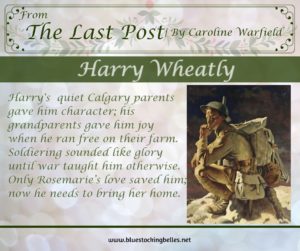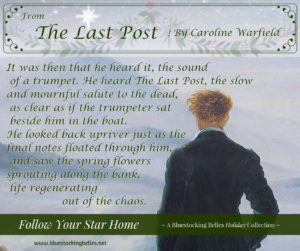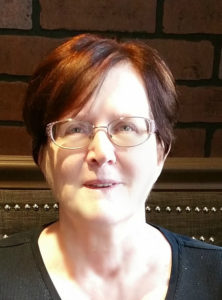 CW: First of all, Harry, thank you for your service. You joined the Canadian Expeditionary Force almost as soon as conflict broke out in 1914. What motivated you?
CW: First of all, Harry, thank you for your service. You joined the Canadian Expeditionary Force almost as soon as conflict broke out in 1914. What motivated you?
HW: I wish I could say it was an clear-sighted patriotism, but I have to confess I was a somewhat muddled university student. Yes, I heard the bands and the speeches, and got caught up in the enthusiasm. However, being dumped by a young lady I thought I loved pushed me as well. The morning I signed up I was hung over from trying to heal a broken heart with gin.
CW: You merely thought you loved her?
HW: I had no idea what love meant then. I do now.
CW: How did you take to army life?
HW: The discipline felt good, the uniform fit comfortably, and the food was beyond horrid. What mattered in the end was the comradeship—that I will never forget. It is deeper and more vital than anyone who has never served will ever understand. War, however is hell.
CW: Can you talk about it?
{there is a long pause}
HW: Surrounded by death and rot, your soul begins to shrivel and die. We lived surrounded by mud and the smell of decay in the trenches. You begin to want to go over the top just to escape, but you know that way lies catastrophe. Even when we rotated out of the ditches, the colorless world weighed me down. Trees and fields were stripped of vegetation; we lived in a sea of mud. Army uniforms, tents, tools, and trucks painted the entire universe in shades of brown. At the beginning I wrote poetry to keep going but I ran out of metaphors for death, for the mud, and words for the color brown. I almost gave in to despair and lost my will to live. I would have if I hadn’t found Rosemarie.
CW: How did you find her?
HW: A bitter soldier threw my grandmother’s bible, my one great token of home, into an ooze of mud. I took it to the Somme to clean it, and it floated away. When I chased it, I saw a woman in a boat reach in and pull it out. I followed her like a beacon of hope to an island covered with green vegetation and flowers. It became my piece of heaven.
CW: We told that story in “Roses in Picardy,” in the Bluestocking Belles’ Never Too Late box set. What happened now that the war is over?
HW: I lost track of Rosemarie when the army pushed into Belgium at the end. My letters were never answered. They sent me to a repatriation camp in Wales. All I can think of is finding her and taking her home to Canada. They won’t let me request space for her on the ships home if I don’t have a marriage certificate, but I can’t marry her if I can’t find her. The Spanish flu laid me low for a while, and now I’m running out of time.
CW: Have you gone back to Amiens?
HW: Not yet but I should! I’ll desert if I have to.
CW: What happened in the intervening years since you met Rosemarie in 1916 (“Roses in Picardy”) and your efforts to find her in 1919 (“The Last Post,”)
HW: War happened! We saw each other for months until the campaigns started in the spring. Even then I stole moments away. The Germans advanced on Amiens. I am terrified they came right up to her little cottage. She must have evacuated but I don’t know where she went. You should write that middle piece. In fact you should put it all together in one full-length book so readers can follow our entire story.
CW: Hmm. That is a good idea. I may do just that.
About Follow Your Star Home:
Divided sweethearts seek love and forgiveness in this collection of seasonal novellas. Forged for lovers, the Viking star ring is said to bring lovers together, no matter how far, no matter how hard. In eight stories covering more than a thousand years, our heroes and heroines put this legend to the test. Watch the star work its magic as prodigals return home in the season of goodwill, uncertain of their welcome. You can find it here: https://bluestockingbelles.net/belles-joint-projects/follow-your-star-home/

About The Last Post
The Great War is over, but how can they marry if he can’t find her? Love for Rosemarie Legrand gave Harry the will to go on during the horror of trench warfare. Now, army orders trap him in a camp awaiting repatriation. A bout of the Spanish flu lays him even lower, but he is determined not to leave without her. He’ll desert if he has to.
Rosemarie waits for word on her cousin’s farm where she took refuge when war reached the outskirts of Amiens. She wrote to tell him. Has he forgotten her? When the slimmest of information arrives, she sets out to find him.
About Caroline Warfield

Carol Roddy – Author
Award winning author Caroline Warfield has been many things: traveler, librarian, poet, raiser of children, bird watcher, Internet and Web services manager, conference speaker, indexer, tech writer, genealogist—even a nun. She reckons she is on at least her third act, happily working in an office surrounded by windows where she lets her characters lead her to adventures in England and the far-flung corners of the British Empire. She nudges them to explore the riskiest territory of all, the human heart.
Visit Caroline’s Website http://www.carolinewarfield.com/
Meet Caroline on Facebook https://www.facebook.com/carolinewarfield7
Follow Caroline on Twitter @CaroWarfield
Email Caroline directly warfieldcaro@gmail.com
Subscribe to Caroline’s newsletter http://www.carolinewarfield.com/newsletter/
Amazon Author http://www.amazon.com/Caroline-Warfield/e/B00N9PZZZS/
Follow Caroline on Good Reads http://bit.ly/1C5blTm
Follow Caroline on BookBub https://www.bookbub.com/profile/caroline-warfield

This is gonna be a special read. Can’t wait for the box set. Gotta love them Belles
This is a test comment.